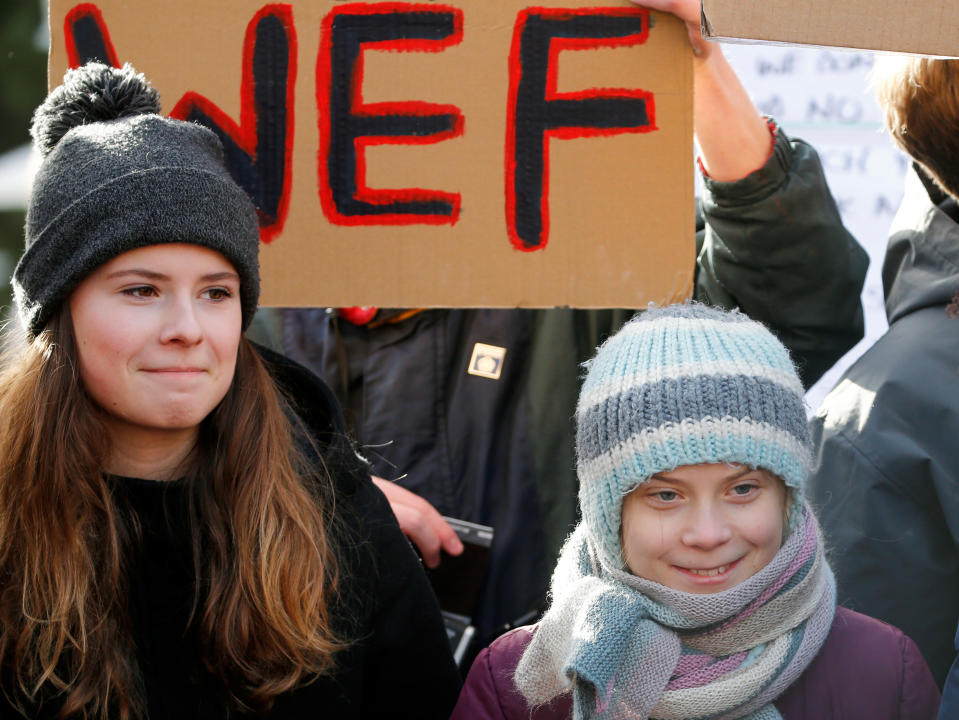'Flight shame' is not going away
The World Economic Forum in Davos, Switzerland this week featured high-profile business figures and world leaders talking about the environment and the risks of climate change (though others were more skeptical).
Still, many attendees came by private plane, a fact some said undermined the event’s green agenda. According to the World Economic Forum, around 600 flights were made in 2019 to Davos, not including the military planes of world leaders.
Meanwhile, the youth delegates representing the next generation that will have to deal with the climate crisis took the train and slept in tents.
Local Davos teens who participated in the discussion about climate change – the central theme of this year’s conference – chanted “stop flying to us.”
Though “flight shame” (or “Flygskam” or “Flugscham” in Swedish and German, respectively) is explicitly endorsed by the de facto leaders of this generation of environmentalists, like Greta Thunberg and Luisa Neubauer, the phenomenon of people pledging not to fly because of its detrimental environmental impact, originated in these northern European circles. But it’s becoming an issue beyond the transportation modes of the Davos elite.

Though Norwegian Air told Yahoo Finance last year that the proliferation of “flight shame” hasn’t resulted in fewer bookings, it’s becoming a key issue in airline messaging: People may always need to fly but airlines need to do their part to offset their contributions to emissions.
“Someone flying from London to New York and back generates roughly the same level of emissions as the average person in the EU does by heating their home for a whole year,” according to the European Commission.
This week JetBlue (JBLU) CEO Robin Hayes warned that the flight-shaming phenomenon could begin to affect the U.S. Already many airlines like JetBlue, Delta, and others have been figuring out how to minimize carbon footprints by buying efficient aircraft and more. (JetBlue recently announced plans to become carbon neutral this year.)
“This issue presents a clear and present danger if we don’t get on top of it,” Hayes said on the company’s earnings call this week. “We’ve seen that in other geographies, and we should not assume those sentiments won’t come to the U.S.”
Last summer Greta Thunberg’s transatlantic crossing by sailboat — to draw attention to aviation emissions — carried the concept of flight shame, prompting an avalanche of trend pieces on the European movement, “flygskam,” the most viral Scandinavian buzzword since “hygge.”

According to a few European airlines that Yahoo Finance spoke with, flight shame doesn’t appear to be having a large effect, though now-defunct operator Thomas Cook had said that the “environmental movement against air travel” had impacted its Northern Europe unit.
Given the U.S.’s size and lack of alternate infrastructure like trains, aside from Amtrak and a few commuter lines, the movement may not have the same potential as the rail-friendly European continent with smaller countries in terms of how it changes travel behavior.
But it’s likely it could have an effect on airline profitability if companies feel pressured to spend further on carbon offsetting in an effort to achieve carbon neutrality. Furthermore, business travel, a key revenue component for many airlines, could be affected if companies are pressured to travel less — which is now easier thanks to better teleconferencing technology. Though the phenomenon is early, it’s clear that flight shame isn’t going away.
-
Ethan Wolff-Mann is a writer at Yahoo Finance focusing on consumer issues, personal finance, retail, airlines, and more. Follow him on Twitter @ewolffmann.
The first thing to do after you're involved in a hack, according to experts
Companies are secretly scoring you, but good luck getting your data
'Snake oil salesmen': Two neurologists respond to the CBD craze
Large-scale credit card hackers back for the holiday season, ex-FBI investigator says
Read the latest financial and business news from Yahoo Finance
Follow Yahoo Finance on Twitter, Facebook, Instagram, Flipboard, LinkedIn, YouTube, and reddit.

 Yahoo Finance
Yahoo Finance 